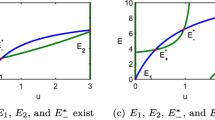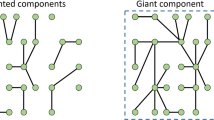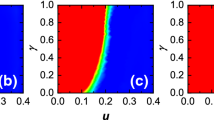Abstract
Axelrod has developed an evolutionary approach to the study of repeated games and applied that approach to the Prisoners' Dilemma. We apply this approach, with some modifications in the treatment of clustering, to a game that has the Prisoners' Dilemma and Chicken as special cases, to analyze how the evolution of cooperation differs in the two games. We find that the main barrier to the evolution of cooperation in Chicken is that cooperation may not always be correctly thought of as socially optimal, but that strong forces do push the players toward socially optimal action. We derive some of the results on mixed populations for any game with pairwise interaction.
Similar content being viewed by others
REFERENCES
Axelrod, R. (1980). The emergence of cooperation among egoists. University of Michigan. Mimeo.
Axelrod, R. (1981). The emergence of cooperation among egoists. American Political Science Review 75: 306–318.
Axelrod, R. (1984). The evolution of cooperation. New York: Basic Books.
Bergstrom, T. (1984). Repeated Prisoners' Dilemma with noisy signals. Presented at Conference on Strategic Behavior and the Theory of the Firm, University of Western Ontario.
Bishop, D.T., and Cannings, C. (1978). A generalised war of attrition. Journal of Theoretical Biology 70: 85–124.
Cornell, B., and Roll, R. (1981). Strategies for pairwise competition in markets and organizations. Bell Journal of Economics 12 (Spring): 201–213.
Hallagan, W., and Joerding, W. (1983). Polymorphic equilibrium in advertising. Bell Journal of Economics 14 (Spring): 191–201.
Kreps, D., and Wilson, R. (1982). Reputation and imperfect information. Journal of Economic Theory 27: 253–279.
Kuhn, H. (1953). Extensive games and the problem of information. In H. Kuhn and A. Tucker (Eds.), Contributions to the theory of games, Vol. 2. Princeton: Princeton University Press.
Lipman, B.L. (1985). Cooperation among egoists in Prisoners' Dilemma and Chicken games. University of Michigan, Discussion Paper.
Maynard Smith, J. (1982). Evolution and the theory of games. Cambridge: Cambridge University Press.
Maynard Smith, J., and Price, G.R. (1973). The logic of animal conflicts. Nature 246: 15–18.
Nelson, R.R., and Winter, S.G. (1982). An evolutionary theory of economic change. Cambridge, MA: Belknap Press of Harvard University Press.
Rosenthal, R.W. (1979). Sequences of games with varying opponents. Econometrica 47 (November): 1353–1366.
Schelling, T.C. (1960). The strategy of conflict. Cambridge, MA: Harvard University Press.
Snyder, G. (1971). ‘Prisoners' Dilemma’ and ‘Chicken’ models in international politics. International Studies Quarterly 15: 66–103.
Spence, A.M. (1979). Investment strategy and growth in a new market. Bell Journal of Economics 10 (Spring): 1–19.
Author information
Authors and Affiliations
Additional information
I wish to thank Ted Bergstrom. seminar participants at the University of Michigan and the 1983 meetings of the American Political Science Association, and the referees for their comments and suggestions. I also wish to thank Kelly McCauley for helping me clarify my writing and thinking. Finally, I want to especially thank Robert Axelrod for his encouragement and advice on this paper. Of course, any remaining errors are my responsibility.
Rights and permissions
About this article
Cite this article
Lipman, B.L. Cooperation among egoists in Prisoners' Dilemma and Chicken games. Public Choice 51, 315–331 (1986). https://doi.org/10.1007/BF00128880
Issue Date:
DOI: https://doi.org/10.1007/BF00128880




